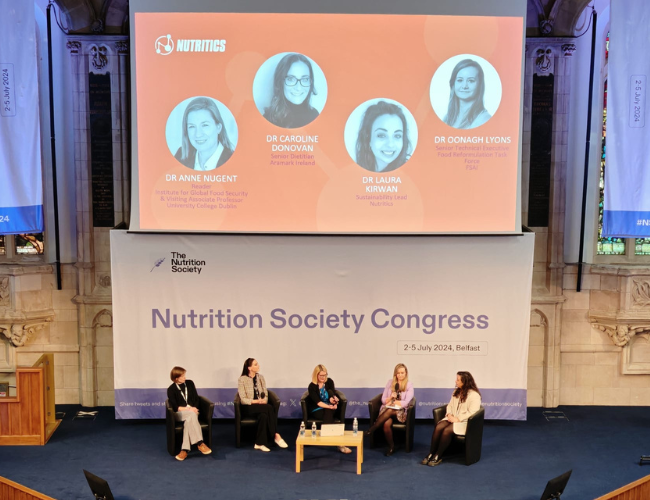Sustainable Diets: Education, Food Service and Policy Perspectives
Sustainable Diets: Education, Food Service and Policy Perspectives
The Nutrition Society Congress gathered leading experts to explore current research and global challenges in nutrition science. Its aim was to provide an overview of the diversity of the data within the field of nutrition science and how it can be utilised as part of a sustainable global food system.

Sharing nutrition science insights
The Nutrition Society Congress took place from July 2nd – 5th 2024, with its aim being to highlight the discipline of nutrition science; in particular diverse its diversity, ranging from the study of human health from a molecular to a public health level, from an ingredient or nutrient level to the global food system.
As proud supporters of the Nutrition Society, Frankie Douglas, Director of Scientific & Regulatory Affairs, and Dr Laura Kirwan, Sustainability Lead both attended on behalf of Nutritics, speaking about the vital role that food plays in the resolution of our global nutritional and environmental crisis.
“Data and technology are essential to achieving an evidence based transition to healthy sustainable diets, and we need to empower nutritionists to lead this change. The Nutrition Society provides an important platform for knowledge sharing, networking, and driving forward innovations like Nutritics and Foodprint that will help shape the future of nutrition and research.”
Dr Laura Kirwan | Sustainability Lead at Nutritics
Key takeaways for industry
-
Focus on protein-rich diets
For older adults, particularly those at risk of undernutrition and cognitive decline, offering meals that are high in protein and adhere to Mediterranean diet principles can be highly beneficial. These meals should include lean proteins, such as poultry, fish, legumes, and dairy, as well as fruits, vegetables, whole grains, and healthy fats like olive oil.
-
Design nutrition programs
Implement engaging nutrition education programs that incorporate hands-on activities like cooking classes and tasting sessions. These practical experiences can enhance food literacy, promote healthier dietary choices, and help establish long-term healthy eating habits. Partnering with public resources or community centres to deliver these programs can enhance reach and impact (OC07).
-
Leverage software for menus
Utilise digital tools like the ‘Foodprint’ environmental impact tool to assess and improve the sustainability of your menu items. These tools can help in identifying opportunities for recipe reformulation that reduces carbon and water footprints while maintaining or enhancing the nutritional value of dishes, supporting both environmental and health goals (OC37).
Download the ‘Masterclass in Healthy Sustainable Diets’ ebook
Get a copy of the ebook now, featuring: what happened at the Nutrition Society Congress, our take on the findings and industry research highlights.